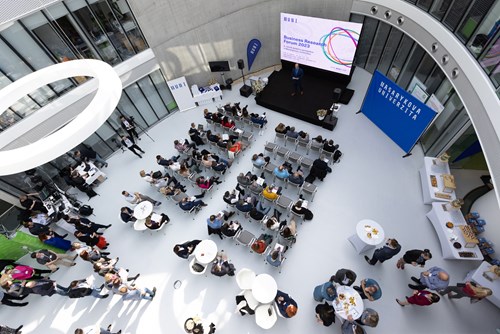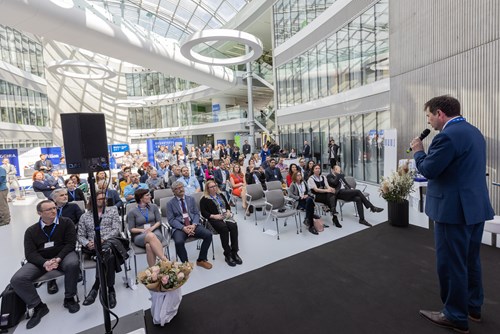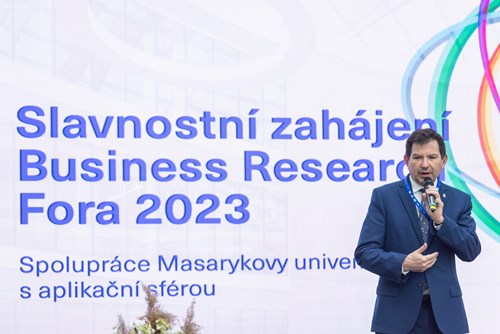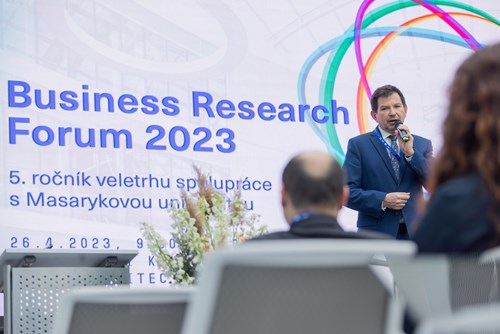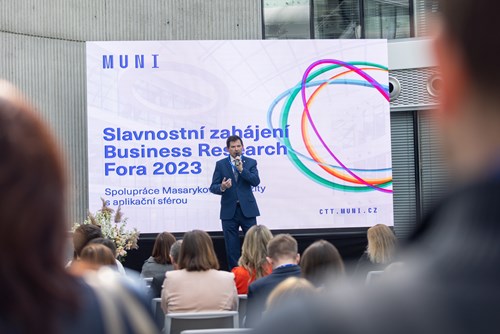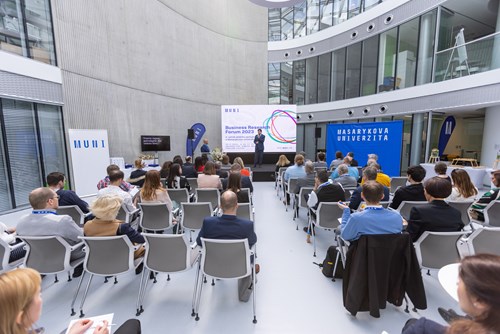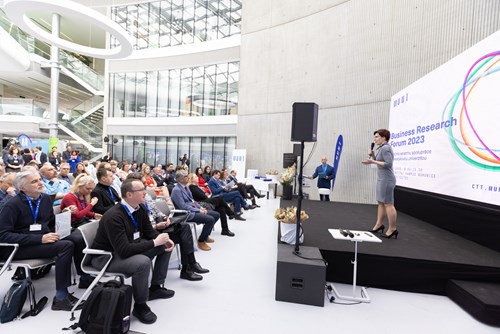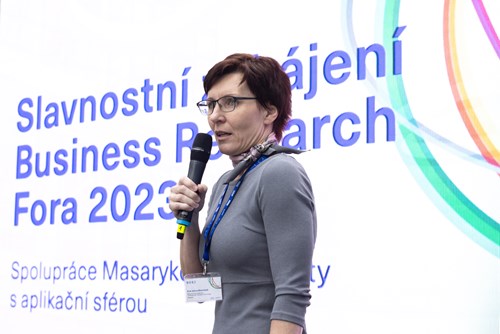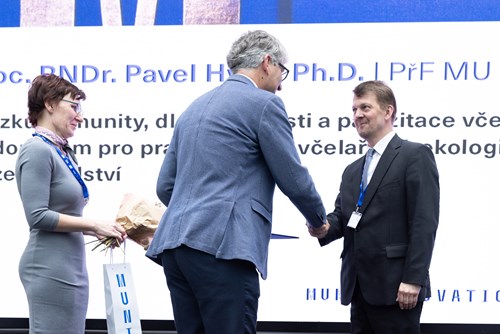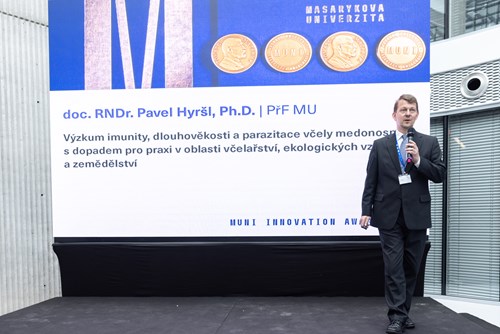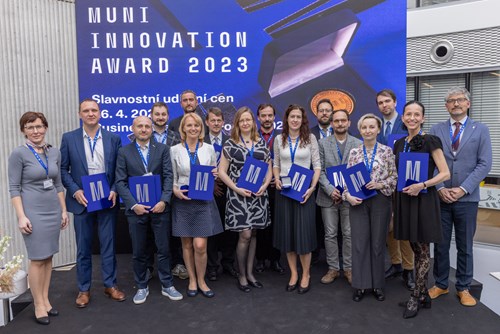Pavel Hyršl has received the MUNI Innovation Award 2023
The research of Pavel Hyršl has made a positive contribution in the fields of beekeeping, ecological relationships and agriculture. The results have provided an overview of the changes in parasitised bee bodies that result in impaired health and the death of bee colonies. Congratulations on the award.
26 Apr 2023
Zuzana Jayasundera
Pavel Hyršl

Pavel Hyršl receives the MUNI Innovation Award 2023. Photo: Majda Slámová
How was the 2023 MUNI Innovation Award ceremony?
The MUNI Innovation Award 2023 was received by Pavel Hyršl at a special ceremony held during the Business Research Forum, which took place on April 26, 2023, at 2 pm in the CEITEC MU pavilion at the Bohunice University campus. The award was won by Pavel Hyršl for his research into immunity, longevity and parasitism in the honey bee (Apis mellifera) and its impact on agricultural practice, and for long-term educational activities aimed at both the general and professional public, including cooperation with the Bee Research Institute, s.r.o. and The Ministry of Agriculture of the Czech Republic. As the awardee himself states about the importance of research for bee keeping practice, “the honey bee, as our most important pollinator of plants, is currently under pressure from many influences, including biological, chemical, climatic and anthropogenic factors. These all cause the weakening of bee colonies, which then have a harder time facing pathogens and parasites, potentially causing the collapse and demise of the bee colony. I am glad that our research is directly connected with practice; we are in constant contact with beekeepers and, as an outcome, the results obtained should help them and their bees. Our work has focused especially on the issue of bee longevity, where the successful establishment of a long-lived winter generation of bees is necessary for successful overwintering, and on parasitism by the Varroa mite (Varroa destructor), which causes the disease varroosis, something every beekeeper must suppress. We try to pass on our knowledge to the public, either through the pages of beekeeping magazines or in the form of lectures, seminars and workshops”, said Pavel Hyršl about his research.

Pavel Hyršl sampling bees in the field. Photo Archives of the Laboratory
Let us remind you that the MUNI Innovation Award is awarded to Masaryk University (MU) students and employees whose outputs have successfully been put into practice, helped to improve products or services, or contributed to increasing the social relevance of MU research in any other way. This year, a total of 31 nominations were received, from which the expert committee selected 11 initiatives with the greatest innovative potential or societal impact.
Over the last decade, SCI MUNI has had much success with its comparative immunology research
Pavel Hyršl works at the Section of Animal Physiology and Immunology at the Department of Experimental Biology, where he heads the Laboratory of Comparative Immunology. There, scientists and students examine the immune reactions of insects and monitor the signalling pathways involved in their regulation, the function of individual genes and differences in response to different stimuli, such as bacterial infection or parasitism. In addition to the researcher, Mgr. Pavel Dobeš, Ph.D., three doctoral students are also working on bees, Mgr. Jana Hurychová, Mgr. Sara Šreibr and Mgr. Jacek Marciniak.
As stated by the awardee Pavel Hyršl, “over the last decade, the laboratories of the Department of Experimental Biology have achieved interesting results in the field of bee physiology, immunity and behaviour, which the members of the laboratories have then published in prestigious foreign journals. They also organised three successful workshops for beekeepers, where they introduced their results to the attendees and guided them through the laboratories and gave practical research demonstrations. Other outputs include published methodologies and a product designed to support bee immunity”, he concluded. Let’s take a closer look at some of the projects.

The Laboratory of Comparative Immunology team members. Photo Kateřina Tomanová
Bee longevity research
The project ‘Longevity of bees and its role in sustainable breeding’ took place between 2016 and 2018 and was focused on physiological and immune differences between short-lived (summer) and long-lived (winter) bee populations from the temperate geographic zone. According to Pavel Hyršl, “whether or not the bee colony will survive the winter is decided at the beginning of autumn. Knowledge about the proportion of winter generation bees in a colony is important, therefore, as it can help prevent winter bee losses. While distinguishing given populations based on external features is almost impossible, this does not apply to individual physiological and immune reactions. As a result of our project, we identified total concentration of proteins, vitellogenin content and level of antimicrobial activity as parameters that can be used to determine whether a given bee belongs to a short-lived or long-lived population”, he concluded.
For this study, the authors received an award from The Ministry of Agriculture of the Czech Republic, highlighting the quality and timeliness of the research conducted. The results obtained during experiments on a few selected bee colonies were verified over the following years on samples of bees sent by beekeepers from all over the Czech Republic. It was confirmed that the parameters monitored were all within expected ranges for the particular time of year, with minimal influence of habitat. Moreover, the parameters could be measured in live bees sent to the laboratory, without transport stress affecting the result.
Studying the dynamics of the immune response
Part of the aforementioned project included the study of immune response dynamics, where researchers addressed the question of how the bee’s immune response to pathogen administration varies over time. Once again, the researchers observed differences between short-lived and long-lived generations of bees, when it became clear that the winter population has an immune system that primarily makes use of humoral immunity, while summer bees rely more on immune cells.
What is Pavel Hyršl’s laboratory doing now? Research on bee pathogens
Members of the laboratory are following up the study of bee longevity with an ongoing project with the National Agency for Agricultural Research of the Ministry of Agriculture, in which they examine changes in the physiology and immunity of bees attacked by the parasitic Varroa mite and the pathogens it transmits. As Pavel Hyršl states, “parasitism by mites and any associated infections are significant factors in the loss of bee colonies during overwintering; however, what actually happens to the bees once attacked is still not fully known. Over the last years, in cooperation with colleagues from the Bee Research Institute, s.r.o., the Veterinary Research Institute, the Palacký University in Olomouc, the Czech University of Life Sciences in Prague and the Institute of Biophysics of the Czech Academy of Sciences, members of the laboratory have carried out two studies on winter and summer bees that involved detailed examinations of worker bees coming from colonies treated with the standard anti-parasitic agent ‘Gabon Flum’ and those from untreated colonies, distinguishing parasitised young bees from those that were not in contact with mites at hatching. A comprehensive review of changes in the bees examined was made possible using the so-called OMICs approach, i.e. an assessment of overall changes in gene activity and the spectrum of proteins and other metabolites using modern high-capacity methods”, he concluded.
The results of these analyses provide an overview of molecular changes in the bodies of parasitised bees that cause deterioration in health and, subsequently, the death of bee colonies. It is well known that mites also act as carriers of other pathogens; thus, as part of the studies, experiments were also undertaken on deformed wing virus, one of the most common viral pathogens under Czech conditions, and its effect on bee physiology and immunity. According to Pavel Hyršl, as far as immunology is concerned, this area has been significantly less explored than classic bacterial infections. However, current laboratory methods enable a detailed examination of reactions targeted against viruses, and thereby lay the background for targeted control in the future.

Isolated bee colonies for the study of the influence of parasitism by the Varroa mite (Varroa destructor). Photo Archives of the Laboratory

arroa destructor mites under a dissecting microscope. Photo Archives of the Laboratory

arroa destructor mites under a dissecting microscope. Photo Archives of the Laboratory

Varroa mite attached to the ventral side of a bee’s abdomen, where it sucks fat body and thus weakens the bee. Photo Archives of the Laboratory
Probiotics
Another ongoing project supported by the National Agency for Agricultural Research of the Ministry of Agriculture, concerns research on the effect of probiotics on bee health. Bees, like humans, have lactic acid bacteria in their digestive tract, and these contribute to improving the host’s health. As part of the project, strains of bacteria with suitable properties were isolated and then applied to bees under laboratory conditions and in bee colonies. Physiological and immune parameters are then measured to clarify whether administration of these bacteria improves the bee’s resistance to pathogens and parasites. The goal for the future is to launch a probiotic product on the market.

Bees of the same age reared under laboratory conditions. The syringes contain a sugar solution, alone or with the addition of probiotic bacteria. Photo Archives of the Laboratory

As bees of the same age are needed for experiments, only freshly hatched young bees are selected. These are individually marked and either returned to the colony or kept in the laboratory. Photo Archives of the Laboratory
Research on the ability of bees to perceive the Earth’s magnetic field.
The projects also include close cooperation with assoc. prof. RNDr. Martin Vácha, Ph.D., whose research focuses on the interesting topic of magnetoreception (the ability to perceive the Earth’s magnetic field) and bee memory. An internal ‘magnetic compass’ complements the already wide range of bee sensory abilities that help orientate them in the field. Bees are able to memorise an extraordinary range of visual, olfactory and magnetic stimuli from the surrounding environment and build a mental navigation map. To test the bee’s ability to store and recall information, researchers use the proboscis extention reflex. The bee is capable of associating certain (even completely unknown) scents with a sugar reward, which prompts it to extend its proboscis as soon as it smells the scent (see picture from the Brno laboratory below). This basic element of the connection between sensory and motor activity taking place in the bee brain appears to be sensitive to the effects of magnetic fields around electrical appliances. One of the tasks that the Brno researchers have set themselves is to find out whether electromagnetic fields generated by modern human technologies are disrupting the ‘compass’ and memory abilities of bees.

A bee exhibiting the proboscis extention reflex. In a laboratory experiment, a bee reacts to an odour it has been trained to recognise by moving its antennae and extending its proboscis in anticipation of food. The test is used to measure the memory abilities of bees. Photo Archives of the Laboratory
This text is based on the article ‘Vivat apidologie − Masaryk University’ previously published by P. Hyršl in the ‘Moderní včelař’ magazine in March 2022.
Translation: Kevin Frances Roche


